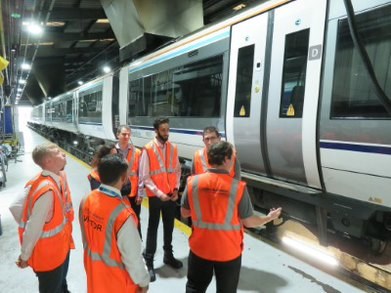
Time to choo-choose a fast track to a rewarding career in rail engineering
The Rail Delivery Group (RDG) is inviting graduates to get on board with a scheme for those seeking to fast track their career in mechanical or electrical engineering with a British rail company.
Successful candidates can join the Railway Engineering Graduate Scheme (REGS) with a route towards Chartered Engineer status.
You don’t need previous rail experience – just a MEng or BEng degree accredited by the IMechE (Institution of Mechanical Engineers) or the IET (Institution of Engineering and Technology) a desire to learn, work hard, be part of a team (plus engine-uity always helps!)
The placement will take the candidate places as they can choo-choose one of the many schemes and they will get hands-on experience in the UK, and possibly further afield.
REGS focuses on all aspects of train maintenance and includes engineering aspects of maintenance, maintenance management, technical standards, project engineering, contract management, vehicle overhaul, operations and engineering design.
Last year saw 10 candidates on REGS, which coordinates the many graduate schemes run by passenger train and freight operators, including SWR, Avanti West Coast, East Midlands Railway and Freightliner. You don’t need to be a recent graduate, but just have the required degree. Candidates can apply direct to one of the operator schemes which start in September 2023, or if applicants apply via RDG, they will advise candidates where schemes are running.
56 graduates have participated in the scheme since 2018, with 22 successfully becoming Chartered Engineers, which is typically a four-year process. Many more are still progressing on the REGS scheme.
In total since 2001 72 candidates have attained Chartered Engineer status.
Jacqueline Starr, chief executive officer at the Rail Delivery Group said; “The success of REGS graduates proves why this first-class training is so vital to our industry. Not only in providing a dedicated career path, but also in ensuring that the future of the industry is supported by the talented individuals that have been part of REGS.”
Jeena Gill, Production Manager, South Western Railway, joined REGS in 2019 and is enthusiastic about the additional benefits to her career as a result of REGS.
She said: “It’s the fact that a lot of industry know about the scheme and therefore are willing to help where possible
“My placement timings coincided with Covid lockdown but, with the help of the REGS team who are well respected in the industry, I secured a great placement. In 2022, I went on an industry exchange with Central Japan Railways who operate the trains in Tokyo and Osaka. It was a great learning experience and one I wouldn’t have got without REGS.”
Stacy Thundercliffe, Head of Fleet and Engineering, Avanti West Coast joined REGS in 2005. She is in no doubt of how it has positively impacted her career.
She said: “REGS exposed me to opportunities that I’d never have got otherwise.
“It allowed me to become a Chartered Engineer and gave me a great foundation of experience. It helped me to go up that steep learning curve rapidly and even today I draw on experience I was exposed to in those early REGS years”.
Munira Somani, Senior Safety Business Partner at East Midlands Railway has benefited from REGS in her career.
She said: “I was fortunate to have been part of the REGS scheme in 2005 when National Express had a number of franchises across the UK.
“It can be difficult to gain experience of the different life cycles of the train from design, build, maintain, refurbish and decommission. The REGS scheme brings together a network of individuals which means the graduate has opportunities to reach out to various companies and gain the necessary experience, and exposure to all areas of asset management.
“It has given me an appreciation of the challenges of balancing costs, opportunities and risks against the desired level of performance.”
Neil Drury, Engineering and Infrastructure Director at South Western Railway, began the scheme in 2004, and believes schemes such as REGS are vital to the industry’s growth and also in providing a pathway for engineers.
Neil said: “There aren’t many graduate schemes around and there is a great need for them and that’s why REGS is so important.
“The REGS network provides invaluable advice and contacts with the added benefit of having mentors to talk to and identify opportunities. The rail industry is never dull and it provides a practical environment for future engineers so perfect for those who like to get stuck in and get their hands dirty!”
